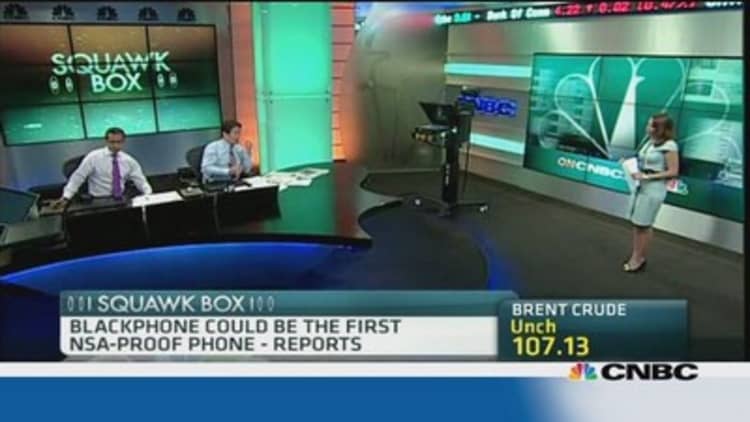
For many years, the BlackBerry smartphone was the de riguer for business with the Canadian handset maker renowned for its robust messaging software.
But a new contender has announced itself on the scene, promising to take on BlackBerry's BBM and be the world's first smartphone "placing privacy and control directly in the hands of its users".
In perhaps a direct nod to the mobile handset it is trying to replace, the new device is called the Blackphone, and has been developed by a team of entrepreneurs, technology experts, cryptographers and even a former U.S. Navy SEAL.
(Read More: Apple-China Mobile deal a 'watershed' moment: Tim Cook)
"I have spent my whole career working towards the launch of secure telephony products," Phil Zimmermann said in a press release on Wednesday. Zimmermann, the creator of PGP encryption software, is working on the project with members of Spanish startup Geeksphone as well as encrypted communications firm Silent Circle.
"Blackphone provides users with everything they need to ensure privacy and control of their communications, along with all the other high-end smartphone features they have come to expect." Zimmermann added.
The new device—which will be officially launched at the Mobile World Congress in Barcelona in February—is a "carrier- and vendor-independent smartphone," according to the press release, and is powered by custom-built security-oriented Android software called PrivatOS.
The price of the smartphone will announced at February's event. The company's website says it would still have the features necessary to do all the things you need but adds that the tools installed on the Blackphone give you everything you need to take ownership of your mobile presence and ensure nobody else can watch you without your knowledge.
"You can make and receive secure phone calls; exchange secure texts; exchange and store secure files; have secure video chat; browse privately; and anonymise your activity through a VPN (virtual private network)," the website says.
(Read More: The Snowden effect? Whistleblowing sees sharp rise)
Its unique selling point of privacy and security looks to be in direct competition to BlackBerry's encryption, Samsung's Knox service and other more established rivals.
This comes at a time when privacy has become part of the public debate with revelations from former National Security Agency contractor Edward Snowden. Snowden has released explosive documents detailing U.S. surveillance operations. A report in December from German magazine Der Spiegel said U.S. security authorities have intercepted computer shipments and hacked Microsoft's error reporting system.
Meanwhile in October, The Washington Post reported that the National Security Agency had hacked into main communication links that connect accounts at Google and Yahoo worldwide.
Benedict Evans, an analyst at Enders Analysis, told CNBC that despite security breaches regularly being in the news, Blackphone would find it hard to turn this into sales.
(Read More: NSA hacks Microsoft error messages: Report)
"(It's) not very interesting," he said via email. "There's a very small number of people who really care about these issues enough to buy such a product."
Neil Mawston, executive director at Strategy Analytics, believes the company would only really be able to sell a few thousand models due to limited distribution. He added that he expected that the company would look to selling its security technology to another company in the longer term.
"We believe the Blackphone is a niche product right now. Privacy and security are concerns for everyone, but they are not yet primary buying criteria for most smartphone shoppers," he said.
"Blackphone may be a 'build it and flip it' technology. The developers may have potentially created something that is interesting enough to be bought out by one of the major device brands, like HP or Dell."
By CNBC.com's Matt Clinch. Follow him on Twitter @mattclinch81.


